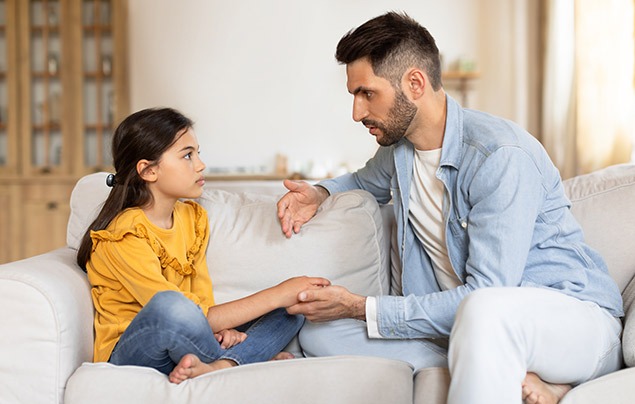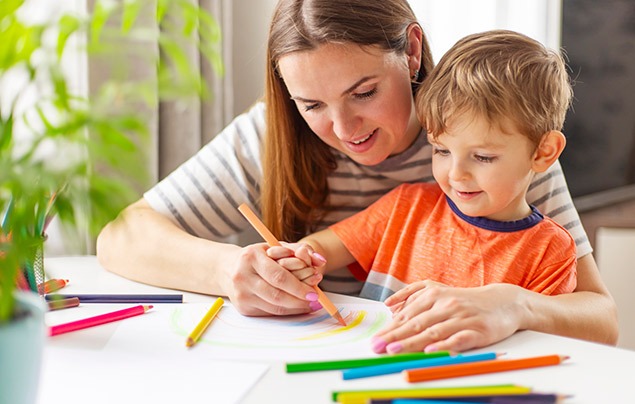Kids get disappointed sometimes. Here’s how you can help them deal with it…
Sometimes your kids’ must-have gift just isn’t going to happen, and that’s okay. Check out these top tips to help them process their feelings.
On picture-book Christmas mornings, children leap up to trees packed with presents of all sizes. But in reality, the global cost of living crisis and inflation have affected the gift-giving season, and many parents are thinking of scaling back.
According to retail analysts at GlobalData, consumers plan to shop and spend less in 2023, cutting down on the number of gifts they buy. That means children might end up with fewer toys or not getting the expensive gift they had their hearts set on. And that’s going to leave a lot of kids really disappointed.
But learning to cope with tricky emotions is an important life skill. Here are some ways parents can avoid meltdowns and help children learn how to deal with disappointment…
The brain science behind disappointment
Located in the ‘emotional control centre’ of the brain, the amygdala perceives any big emotion a child feels as a threat. “A chain of events, also called the fight-or-flight response, then occurs that prepares the body to respond to that threat,” says Sarah Conway, a psychologist in Wollongong, Australia, and owner of Mindful Little Minds. “During this time, stress hormones in the body increase, and the area of the body responsible for thinking, reasoning and planning goes offline.”
For children, that’s because the area of the brain responsible for impulse control and logical thinking doesn’t fully develop until people are in their mid-20s. “Much of their behaviour in these moments is out of their conscious control, as the brain is only focused on survival,” Conway says.
So, when a child is disappointed, they’re literally unable to access reason. Unlike adults who think with their prefrontal cortex – the rational, decision-making part of the brain – children use their more reactive amygdala, or emotional brain. “When kids want something, they want it now,” Conway says. “They have no ability to wait or delay gratification.”
Looking for more parenting advice, alongside good news stories from around the world and fun, family-friendly activity ideas? Then sign up for our Family Round-Up newsletter here!
Conway adds that children also haven’t had a lot of practice when it comes to managing their emotions. “So, when they don’t get what they want, it might be the worst thing that has happened in their short lives,” she says. “Or at the very least, that’s what it feels like to them.”
Why your kid needs to experience disappointment
Disappointment happens when reality doesn’t live up to expectations, and the feeling can manifest in various ways. Some children may throw tantrums or withdraw; others may steal or show aggression.
Those reactions, of course, will not serve them well as adults. So, when children learn how to deal with disappointment, they also learn to self-regulate strong emotions, says Melissa Hunt, children’s program supervisor at St. Clair County Community Mental Health in Port Huron, Michigan, USA.
“We hate to see our kids disappointed. And it would be really amazing if we could just take that feeling away and make everything perfect,” says Hunter Clarke-Fields, author of Raising Good Humans. “But we do our children a disservice when we try to protect them from all the uncomfortable feelings.”
When kids are overly protected, they reach early adulthood unprepared to handle life’s pains and difficulties. And they end up as anxious and overwhelmed young adults. Research has suggested that parents of anxious children tend to have more negative expectations of their children’s ability to cope with stressful situations and are more likely to intervene for their children when they display negative emotions or are in distress.
“It’s healthy for kids – with the loving support of their parents – to go through uncomfortable feelings and realise how they can handle it,” Clarke-Fields says.
Talk about how to deal with disappointment
Disappointment is an inevitable human experience, but parents can take this opportunity to guide their child through a difficult period. “At some point, we’re all going to be let down,” says Lindsey Rosen, a Denver-based postdoctoral fellow in developmental psychology. “And if kids can learn to manage disappointment, then they can learn how to respond in productive ways.”
Here are some tips to start the conversation and help your kids deal with disappointment…
Be honest.
Clarke-Fields suggests sharing the potentially disappointing news with your child honestly and directly, and providing an age-appropriate explanation for why the child is going to have to wait for their gift – or not receive it at all.
For instance: “I really wish I could have got you this, but I couldn’t this year,” or “I’ve bought you the toy, but it’s not quite ready yet – it’ll arrive in February. Shall we mark it on the calendar so you can look forward to it?”
Accept their emotions.
Allow your child to experience their disappointment, then validate their feelings. “Don’t belittle the child or tell them to ‘just toughen up’,” says Linda A. Camras, professor emerita in psychology at DePaul University’s College of Science and Health in Chicago.
That includes trying to change their feelings or talk them out of being disappointed. Camras also advises against telling kids they should be grateful for what they do have. “As parents, our job is to be as present as you can be and listen,” Clarke-Fields says. “It’s not like there’s anything to change at that point.”
Label the feelings.
The most important thing, especially for younger kids, is to name the feeling. “If a kid finds out they’re not getting a gift, they may not feel sad right away. They might be angry, frustrated, confused, or acting out of control,” Rosen says. “The kid might be feeling all those things for the first time.”
Instead, help children name that experience: You’re feeling disappointed. “Now, the kid has a vocabulary and the ability to put a name to the feeling,” Rosen says. “That’s a huge step towards emotional intelligence.”
Understand the true disappointment.
Adults sometimes make an assumption that a child is disappointed for a certain reason, when really it’s something else. For example, a parent might assume their child is disappointed that a bicycle didn’t appear under the tree, but they’re actually sad about not being able to join their friends on a bike ride.
“Spend time helping kids unpack that moment so that they have the opportunity to connect with what they’re thinking, feeling, noticing and doing,” says Andrea Hussong, professor of psychology and neuroscience ad the University of North Carolina. Clarke-Fields suggests going for a walk with your child or colouring side-by-side, so they don’t feel the pressure of a face-to-face conversation.
Set realistic expectations.
If you haven’t already, don’t overpromise for the holidays. “Giving children a list of realistic options can lead to less disappointment in the end,” Hunt says. (If you have overpromised, refer back to tip one.)
Practice soothing techniques.
Try deep breathing, colouring, writing, playing with slime or even crumbling paper. Hunt suggests practicing these soothing techniques any time a stressful situation comes up. “It’s like a fire drill,” she says. “Practising these techniques before the crisis allows children to use them when the time is right.”
Model good self-regulation.
Camras urges parents not to get upset themselves when a child is disappointed, but instead share their feelings and demonstrate healthy coping strategies. (For example, “I’m also feeling disappointed that I don’t get to watch you open your gifts.”)
“That’s showing the kids that this is a healthy, normal emotion that everybody feels,” Rosen says. “It’s a part of life, and it’s not so much about if we’re going to experience it, but how we respond to it.”















LEAVE A COMMENT
THANK YOU
Your comment will be checked and approved shortly.
WELL DONE,
YOUR COMMENT
HAS BEEN ADDED!
COMMENTS
CUSTOMIZE YOUR AVATAR